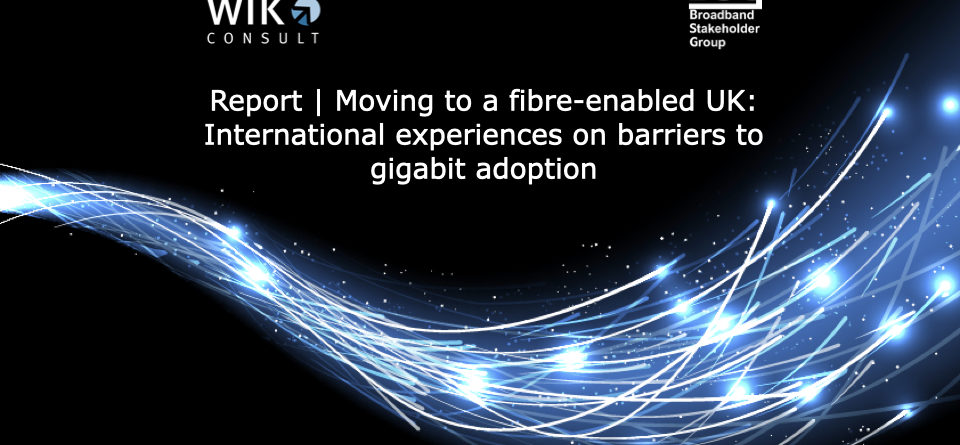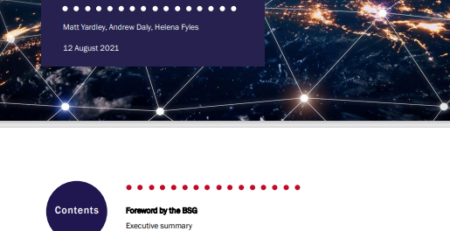BSG report – Moving to a fibre-enabled UK: International experiences on barriers to gigabit adoption
Moving to a fibre-enabled UK:
International experiences on barriers to gigabit adoption
The Broadband Stakeholder Group publishes report by WIK-Consult on international learnings on barriers to UK fibre and gigabit adoption
- Supporting take-up is key to achieving the Government’s ambitions for accelerated deployment of gigabit-capable networks and will be integral to post-COVID-19 economic plans.
- WIK analysis of experiences in France, Italy, Germany and Sweden on their fibre adoption experience reflect the variable factors that drive take-up of gigabit services.
- Learnings for UK industry, policy makers and regulators are set out in four recommendations. These include an emphasis on improving consumer awareness and support for business adoption.
The Broadband Stakeholder Group, the UK Government’s advisory group on broadband, has published a report by WIK-Consult on barriers to fibre adoption by home and business users. The report examines the experiences of France, Italy, Germany and Sweden in driving gigabit adoption and provides lessons for the UK broadband industry, Government and Ofcom as the nation recalibrates as a consequence of COVID-19.
After having analysed patterns of gigabit adoption in four countries, the report identifies four broad recommendations for UK policy makers.
- Address advertising and customer communications to improve consumer and business understanding of the benefits of gigabit broadband – and ability to distinguish between the broadband networks available to them.
- Incentivise take-up of new gigabit broadband connections and address issues of affordability for businesses and consumers
- Leverage digitisation to support the economy and society in a post COVID-19 era
- Facilitate eventual switch-off of the legacy copper network by securing buy-in from all relevant broadband industry stakeholders.
Clare MacNamara, CEO, BSG said: “No gigabit nation was built in a day, but several, like Sweden, have largely been achieved in the course of a decade, with favourable demand-side conditions a critical factor. As the UK seeks to leverage its position as an evolved digital nation, and deployment of new digital infrastructure accelerates, we need to aim for a similar level of fibre adoption to international competitors so that consumers and businesses benefit from the investments being made.
“Now is the time to grasp the opportunity to build on the constructive collaboration achieved between industry, government and the regulator. During this national crisis we must implement these recommendations to speed up our recovery and so that we create the conditions needed to bring consumers and businesses with us towards a fibre-enabled UK.”
Ilsa Godlovitch, WIK-Consult lead author of the report, said: “Take-up of gigabit broadband will be essential to support the business plan for investing in new networks, and is more important than ever as we seek to support new working practices and boost the economy in the post-COVID-19 era. Our report highlights a number of innovative approaches that have been used elsewhere to boost demand – including broadband labelling schemes, vouchers and tax breaks for broadband and digital services. Bringing the industry together to build a common plan for migration to gigabit networks and switch-off of copper, will also be important in supporting digitisation.”
Greg Mesch, CEO of CityFibre said: “Delivering the Government’s goal of nationwide rollout of full fibre by 2025 has never been more important. As CityFibre and others invest billions to future proof the digital connectivity that increasingly supports our lives and businesses, it’s essential that consumers are able to easily choose and switch to these new networks. This timely report outlines the steps required to enable consumers to benefit from the rollout, including the need for clearer broadband advertising. We look forward to working with industry colleagues, Government and Ofcom to deliver them.”
Catherine Colloms, Director of Corporate Affairs and Brand at Openreach said: “We know that new, ultrafast and ultra-reliable broadband can help the UK bounce back more quickly from the Covid-19 crisis. Our new network’s going to boost productivity, slash carbon emissions, and level-up our rural and local economies – and that’s why we’re aiming to reach 20 million UK homes and businesses with full fibre by the mid-to-late 2020s. But all that won’t happen from Openreach building it alone. It is vital that the industry and Government work together to drive faster deployment and rapid adoption, making sure everyone can reap the benefits of full fibre broadband as soon as possible.”
Lucy Thomas, Corporate Affairs Director at TalkTalk said: “Now more than ever, the whole country needs fast, reliable connectivity, so the race to deliver a full fibre Britain is on. These findings make clear that two things are vital to making it happen: cost, so that consumers and businesses can afford the product and are not priced out; and communications – so that people understand all the benefits it brings. By learning the lessons from Europe and elsewhere, we can incentivise take-up and ensure that the full advantages of full fibre are available and affordable for everyone. So it’s down to industry, the Government and regulators to take this on board.”
Andrew Wileman, Director of Regulatory Affairs, Virgin Media: “The importance of connectivity to our lives has never been more apparent than it is right now. Next-generation connectivity has the ability to turbocharge the nation’s economic recovery and Virgin Media is making significant progress to bring gigabit broadband to more than half of the country by the end of 2021. Take up is vital, which is why we welcome the recommendations in the report and urge Government, regulators and industry to come together to explore how they can help drive adoption in this vibrant market.”
Media Contacts: Harri Turnbull – harri.turnbull@techuk.org- 020 7331 2011





